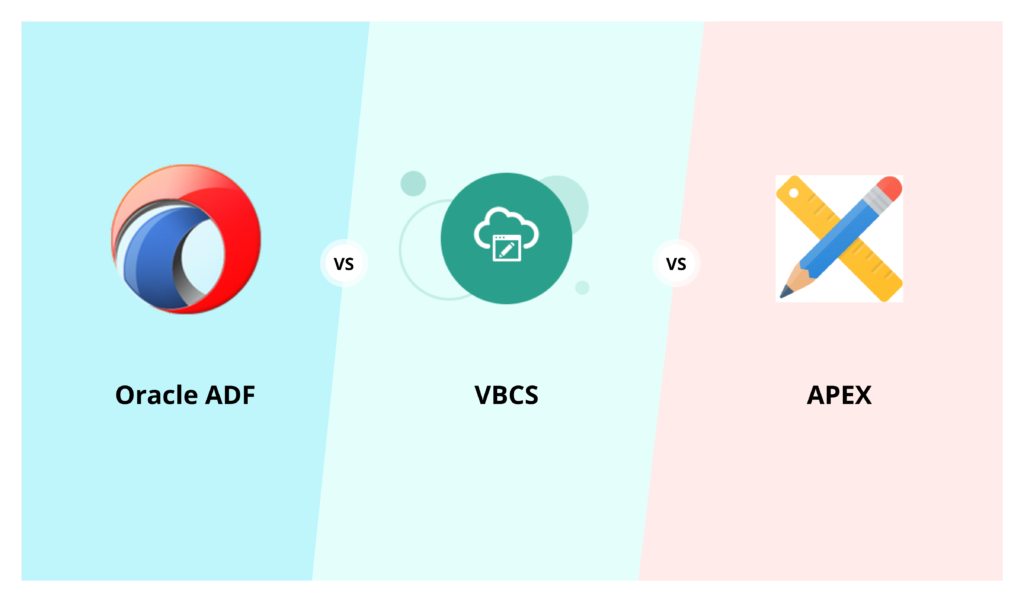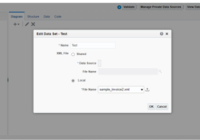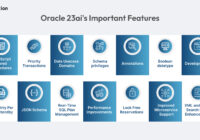Oracle Visual Builder Cloud Service (VBCS) and Oracle APEX are two powerful rapid application development platforms offered by Oracle, each with its unique strengths and capabilities.
In this blog, we will explore the differences between Oracle VBCS and Oracle APEX, comparing their features and benefits. Whether you are considering a low-code solution using Oracle APEX or an application development platform like Oracle VBCS, understanding the strengths and limitations of each platform is essential for making informed decisions and choosing the right platform for your development needs.
Oracle APEX
Oracle APEX is one of the most used low-code application development platforms that has been a no-cost feature with the Oracle Database since 2004, for building and deploying modern cloud, mobile and data-centric web applications 20 times faster than traditional development methodologies. Oracle APEX is Oracle’s strategic low-code application development platform.
Pros of using Oracle APEX
- •
No cost feature with the Oracle Autonomous Database: Oracle APEX is a fully supported no-cost feature of Oracle Autonomous Database and all Oracle Database Distributions and Editions allowing you to leverage the benefits of a managed database environment without additional costs.
- •
Enables rapid creation of aesthetically pleasing data-driven responsive web apps with rich features: It includes Forms, various types of Reports (Interactive Report, Master-Detail, Faceted ..), an Interactive Grid with an excel feel of entering data multiple rows at a time, all securely getting saved in the Oracle database in a single click. They also have widely used Chart types (Pie, Bar, Line, Pyramid, Gantt, Bubble, Range, Area ……) that serves common visualization needs. Calendars, maps, trees, timeline components, wizards, dashboards, and built-in professional UI themes that can be customized to your standards with no knowledge of CSS. With Oracle APEX, you can quickly develop a wide range of applications and data visualizations directly on top of your database, speeding up the development process and increasing productivity.
- •
Workflow: Oracle APEX provides a completely integrated workflow solution enabling developers to automate business processes using an intuitive and visual workflow designer, that is now built natively within the platform.
- •
Low-Code Application development Platform (LCAP): Oracle APEX empowers developers of all skill levels to build robust, scalable, and secure enterprise apps with minimal coding, at least 20X faster in comparison with traditional full stack application development methodologies.
- •
Facilitates easy upload of large files: APEX simplifies the process of uploading and managing large files, making it convenient to handle documents, images, and multimedia content within your applications.
- •
Security: Apps built using Oracle APEX are secure out-of-the-box, using authentication and authorization schemes, secure session management and prevention of cross-site scripting and usage of checksums prevent users manipulating URL parameters.
- •
Provides cost-effective solutions: APEX offers a cost-effective solution for application development and deployment, leveraging existing Oracle technologies and resources without additional licensing costs for many features that otherwise incur more costs.
- •
De-facto technology to migrate Oracle Forms to a completely modern web-based tech: with a responsive UI, bonus of reusability of existing SQL, PL/SQL and other DB objects.
- •
Simplified disaster recovery setup from primary to secondary regions: Oracle APEX supports disaster recovery strategies by simplifying the setup and replication of applications and data from primary to secondary regions or environments, ensuring business continuity and data resilience.
- •
Authentication: Applications can use custom authentication, APEX user accounts, SSO, database authentication, social sign-on and more.
- •
Authorization: Roles based conditional access is configurable with minimal effort.
- •
Pricing: You can check Oracle APEX Pricing here.
- •
Deployment: Oracle APEX runs anywhere where Oracle Database runs.
Particularly, Lift and shift of apps is straightforward and easy as Artifacts can be in a single file (zip file). - •APEX Applications can be deployed in various environments as follows:
- •
APEX on OCI
- •
APEX on-premises
- •
- •
APEX on Azure
- •
AI capabilities: By using Oracle Machine Learning (OML) Notebooks & APEX on OCI, Oracle Cloud users can rapidly build and train models directly on their data present in their database and provide actionable insights to end users. OCI AI services: OCI Vision, OCI Speech, OCI Generative AI, OCI Digital Assistant(ODA) chatbots, OCI Document understanding, OCI Language are fully managed AI services on OCI.
- •
Integration: Create REST data sources to Fusion apps REST APIs to manipulate data in Fusion. Create REST data connectors to various OCI services, Oracle Rest Data services and more. Additionally, other 3rd party web services can also be leveraged via standard PL/SQL web service library to write your own custom code to make SOAP or REST calls.
- •
PWA: Enabling PWA helps the end user to download a desktop icon as a shortcut and a mobile icon shortcut on their smartphone or tablet. Even though it is browser based, it gives the user the impression of a native mobile app.
- •
Oracle APEX can leverage the Power of a converged Oracle Database: It offers support for all modern data types, analytics that can store traditional relational data, spatial data, documents, Json data and now Vector data in Oracle Database 23c.
Cons of using Oracle APEX
- •
Code Lifecycle Management: Working Copy of the app, Merge with Main, Lock Page and Team development features are a step closer to a standardized lifecycle management solution. Otherwise, APEX can also use external tools such as Liquibase, SQL CL etc. to achieve the same. Please refer the whitepaper on Oracle APEX Application Development Lifecycle for more info.
- •
Capability to build ‘Native’ Mobile apps: Oracle APEX does not have the native capability to build APK (Android Application Package) files, which are used for distributing Android applications. APEX compensates with an out-of-the-box PWA (Progressive web app) feature.
- •
Single Sign-On (SSO) complexity with Fusion: Integrating APEX applications with Oracle Fusion applications for single sign-on (SSO) purposes are to be built from scratch.
- •
Knowledge of SQL, PL/SQL, JavaScript, CSS: To build enterprise applications, having good knowledge of the above skills is essential.
Oracle VBCS
Oracle Visual Builder Cloud Service (VBCS) is an application development platform designed for building and deploying web and mobile applications. It offers a visual development environment that allows developers to create applications using drag-and-drop components, pre-built templates, and built-in business logic capabilities. VBCS is used to streamline application development processes, accelerate time-to-market, and enhance agility by providing a low-code development approach. It enables organizations to build responsive web applications as well as native mobile applications, leveraging Oracle Cloud Infrastructure (OCI) for scalability, reliability, and security.
Pros of using Oracle VBCS
- •
Integrated with Oracle Fusion API’s: Oracle VBCS integrates with Oracle Fusion APIs, providing access to the entire Oracle SaaS catalog with just a click, enhancing connectivity and data access capabilities.
- •
Integration with Oracle Process Cloud Service and Oracle Integration Cloud Service: VBCS integrates with Oracle Process Cloud Service and Oracle Integration Cloud Service, enabling streamlined business processes and data integration across applications.
- •
Consumption of ORDS API’s: VBCS allows the consumption of ORDS (Oracle REST Data Services) API’s, facilitating data retrieval and manipulation operations with external databases and services.
- •
Auto-save and recover option: VBCS includes an auto-save and recover option, ensuring data integrity and minimizing the risk of data loss during development or user interactions.
- •
Integration with DEV CS for CI/CD: VBCS is integrated with Oracle Developer Cloud Service (DEV CS) for continuous integration and continuous delivery (CI/CD), supporting version control, migrations, and seamless development workflows.
- •
Better Debugging Capabilities: VBCS offers enhanced debugging capabilities, allowing developers to identify and resolve issues more efficiently during application development and testing phases.
- •
Redwood Theme for consistent look and feel: VBCS adopts the Redwood Theme, providing a consistent user interface and user experience like Oracle Fusion applications, enhancing usability and familiarity.
- •
Built-in data storage and scalability: VBCS provides up to 5 GB of data storage within the built-in database, with the option to extend storage capacity by connecting to Oracle Database, ensuring scalability and data management capabilities.
- •
Users and roles synchronization: VBCS facilitates synchronization of users and roles, ensuring seamless access control and user management across integrated applications and services.
- •
SSO integration with Oracle Fusion using IDCS: VBCS enables single sign-on (SSO) integration with Oracle Fusion applications using Oracle Identity Cloud Service (IDCS), enhancing security and user authentication processes.
- •
Free SFTP server with OIC: Oracle Integration Cloud (OIC) includes a free SFTP (Secure File Transfer Protocol) server with a generous limit of 500 GB, facilitating secure data exchange and integration operations.
Cons of using Oracle VBCS
- •
Limit of uploading documents up to 50 MB: VBCS imposes a limit on uploading documents, restricting file sizes to 50 MB due to API timeout constraints that are dependent on the browser, typically allowing around 4 to 5 minutes for file uploads.
- •
IDCS domain limitations: The default IDCS (Oracle Identity Cloud Service) domain for VBCS allows only 5 secured VBCS applications where groups can be assigned and single sign-on (SSO) can be enabled. Beyond this limit, introducing a new IDCS domain becomes necessary, adding complexity to application management and security configurations.
- •
Manual intervention for disaster recovery: VBCS’ disaster recovery process may require manual intervention, potentially increasing the time and effort needed to restore operations in case of system failures or data loss incidents.
- •
VBCS is only available on OCI – Oracle Visual Builder Cloud Service (VBCS) is a cloud-based platform for building and deploying web and mobile applications. It is specifically designed to work with Oracle Cloud Infrastructure (OCI).
Oracle APEX vs Oracle VBCS – What are the key differences?
Oracle APEX | Oracle VBCS | |
Development Approach | Low-code application development platform (LCAP) that primarily uses SQL and PL/SQL for development, providing developers familiar with any database-centric programming languages, adopt Oracle APEX very quickly | VBCS follows a visual and declarative development approach, allowing developers to create applications using drag-and-drop components and visual editors without writing extensive code. |
Complexity and Flexibility | APEX is well positioned for rapidly developing enterprise scale applications that are Data-centric in nature, requiring quick turnaround times, making it achievable by declaratively using various out of the box UI and reporting components | VBCS is suitable for building complex and feature-rich web and mobile applications with a high level of flexibility in UI design and business logic implementation. |
Integration Capabilities | APEX integrates tightly with Oracle Database and allows for integration with external data sources and web services, but it may require additional configurations for complex integrations in comparison with VBCS.
| Integration between Oracle E-Business Suite (EBS) and Oracle Visual Builder Cloud Service (VBCS) is facilitated through Oracle Integration Cloud (OIC). |
Deployment Options | APEX applications can be deployed in one click, with artifacts packaged in a single zip file. They can be hosted on Oracle Cloud (OCI), on-premises and within 3rd party cloud environments like AWS & Azure with proper setup, however APEX on OCI is the most recommended and widely used option. | VBCS applications can be deployed to Oracle Cloud Infrastructure (OCI) or on-premises environments, offering flexibility in deployment options based on organizational needs and preferences.
|
Skill Requirements | Proficiency in SQL, PL/SQL, JavaScript are essential skills to develop enterprise scale Oracle APEX applications, making it an ideal choice for developers who have database skills and some knowledge of front-end web development.
| VBCS requires knowledge of web development technologies, JavaScript, and Oracle Cloud services, making it suitable for developers with front-end development skills. |
User Interface Design | APEX offers various out of the box UI design components and capabilities with visually compelling templates and themes, so that the primary focus can be on building custom data-driven responsive web applications and Reports, rather than spending time on advanced UI customization. | VBCS provides a rich set of UI components, templates, and themes for designing modern and responsive user interfaces, offering a more visually appealing and interactive user experience. |
So, Oracle VBCS is suitable for building complex and visually appealing web and mobile applications with extensive integration capabilities, while Oracle APEX excels in rapid development of database-centric applications and reports with a focus on data management and analysis. The choice between VBCS and APEX depends on the specific requirements, skill sets, and preferences of the business. If you are still unsure of which development platform to choose, get in touch with us on [email protected].







